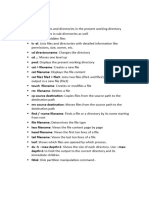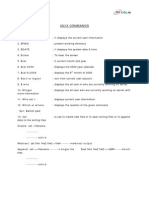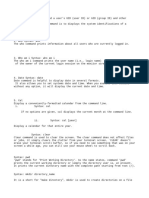Shell_Script_Explanation
Uploaded by
kier.galesShell_Script_Explanation
Uploaded by
kier.gales### Explain Each Function ###
1. **grep**: A command-line utility that searches for a pattern in a file and prints matching lines.
Example: grep "^${username}:${password}$" "$USER_FILE"
- Searches for lines in users.txt where the format matches username:password.
2. **-q**: Makes grep silent; it only indicates whether the pattern was found without printing the
matching line.
Example: grep -q "^${username}:${password}$" "$USER_FILE".
3. **^ and $**:
- `^`: Matches the start of a line.
- `$`: Matches the end of a line.
Example: ^${username}:${password}$ ensures the entire line matches username:password
format.
4. **fi**: Used to close an if block in shell scripts.
Example:
if grep -q "pattern" file; then
echo "Pattern found"
fi
5. **[[ -s $PRODUCT_FILE ]]**: Checks if the file exists and is not empty.
- [[ ... ]]: A test command for conditions.
- -s: Checks if the file is non-empty.
6. **-t <**:
- -s ":" -t < "$PRODUCT_FILE": Specifies the delimiter (`:`) for the column command.
- `<`: Redirects the contents of products.txt to column.
7. **sed**: A stream editor used to manipulate text.
- `-i`: Edits the file in place.
- `/^${name}:/d`: Deletes lines starting with the product name (name:).
8. **/d**: In sed, /d means delete the line that matches the given pattern.
9. **| cut -d ":" -f 2**: The cut command extracts parts of a line based on a delimiter.
- `-d ":"`: Specifies `:` as the delimiter.
- `-f 2`: Extracts the second field.
10. **price=$**: Variable assignment.
Example: price=$(grep ... | cut ...) assigns the result of the command to the price variable.
11. **"Purchased $qty of $name for $cost"**: The `$` in this context is used for variable substitution.
12. **done < "$CART_FILE"**: The done keyword closes a while loop.
- `< "$CART_FILE"`: Feeds the contents of CART_FILE as input to the while loop.
13. **1) add_product ;;**: Matches the user's choice in a case statement.
- ;;: Indicates the end of the command for this case.
14. ***) echo "Invalid option! Please try again." ;;**: A wildcard (*) that matches any input not
handled by other cases.
15. **esac**: Used to close a case block.
16. **main_menu (at the last line)**: Calls the main_menu function, starting the program by
displaying the Main Menu to the user.
You might also like
- # - Essential Linux Commands (+100) - 168747474166950% (2)# - Essential Linux Commands (+100) - 16874747416698 pages
- Learn Enough Command Line To Be DangerousNo ratings yetLearn Enough Command Line To Be Dangerous3 pages
- Kernel: It Is The Core of The UNIX Operating System. It Allocates The Time and Memory ToNo ratings yetKernel: It Is The Core of The UNIX Operating System. It Allocates The Time and Memory To8 pages
- Todos Os Comandos Básicos de A A Z - KaliNo ratings yetTodos Os Comandos Básicos de A A Z - Kali16 pages
- Here's An A-Z of Handy Linux Commands!: Rate This News: (1 Votes)No ratings yetHere's An A-Z of Handy Linux Commands!: Rate This News: (1 Votes)5 pages
- Openvms Commands With Unix Equivalents: Vms CommandNo ratings yetOpenvms Commands With Unix Equivalents: Vms Command8 pages































































